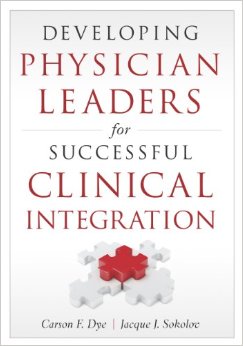"Engaging physicians in the development and management of a clinically integrated healthcare organization is fundamental to the success of every provider organization in this country."
Exceptional Leadership, LLC is uniquely qualified to assist organizations in their physician engagement and leadership development strategies. Organizations may choose from a variety of approaches including:
- Develop, sponsor, and manage physician leadership development programs
- Assess physician engagement and build programs to enhance it
- Build more objective assessment and selection processes to select physician leaders
- Assist organizations in customizing their physician leadership development programs
- Provide physician leadership development retreats and educational programs
- Help organizations identify physician "high potential" leaders
- Develop physician leadership development institutes
- One-on-one customized physician leadership development and coaching
- Assessing physicians for leadership and management positions
- Build leadership competencies into physician leadership development
- Guide new physician leaders as they learn their new roles
- Alignment and integration
- Evaluate physician leadership & management structures
- Retreat facilitation
- Focus groups - identify problems that are harming physician engagement
- Provide a "neutral" ear to physicians and enhance collaboration
Exceptional Leadership LLC has several physician partners who can also serve to facilitate the above consulting engagements.
The changes coming from health reform legislation, cost reduction, work redesign, growth in physician employment, greater consumer involvement, the introduction of ACOs, and the emphasis on value-based purchasing are having a profound and long-term impact on healthcare. Clinical integration is a must, and inclusion of physician leaders is essential for successful clinical integration. For healthcare organizations to maximize their potential during this transition, effective physician leadership is needed more than ever.
Call Exceptional Leadership at 419-350-8383 to discuss approaches to building more effective physician leadership.
Physicians in Management Positions and Physicians in Leadership Positions - Is there a Difference?
Although often used interchangeably, leadership and management are not the same. The fundamental core of leadership is change, while the core of management is ensuring there is order and consistency in day-to-day processes. In the leadership process, the future is assessed and strategies are developed to help the organization adjust its course. Leadership activities are future focused, and improvement is the impetus for these activities. Essentially, this involves identifying needed change and engaging the resources of the organization to move toward a future vision. On the other hand, management processes bring consistency and stability to the organization. Management is rooted in directing, coordinating, and ensuring that there is constancy and order.
Organizations that understand the difference between management and leadership roles can better support the success of physicians who move out of their clinical practices and into different roles within healthcare. For example, physicians who are more hands-on in their work and prefer immediate feedback are better cast in management-oriented jobs. In contrast, physicians who have a sense of the longer-term future, enjoy strategy and think in broader and more systems-oriented terms are more suited for leadership roles.
Read this article in Oct/Nov 2014 Healthcare Executive
Healthcare Executive, Sept/Oct 2014
A Must-Read Book:
Developing Physician Leaders for Successful Clinical Integration. Carson F. Dye, FACHE, and Jacque J. Sokolov, MD. February 2013, An ACHE Management Series book.
Winner of the 2014 ACHE book of the Year
Dye and Sokolov have partnered to share their unique perspectives on the importance of developing the physician leaders of tomorrow. Unlike other physician leadership books, their book is an intensified examination of the development of clinically integrated organizations and the significantly expanded physician leadership role within them. Together Dye and Sokolov evaluate multiple clinically integrated organizations, clinical models, business models, and techniques to involve physicians to a greater degree. They also offer insights and suggestions on the cutting-edge topic of clinical integration and explore in detail the role physician leadership will play in the future.
Themes include:
- Making physicians a key stakeholder in the clinical transformation, business modeling, and strategy development
- Identifying physicians who have a propensity for leadership
- Understanding the difference between management and leadership and the importance of this distinction in organizational management
- Addressing issues physicians face as they make the transition from clinical roles to leadership positions
- Embracing clinical integration—why this new entity calls for greater physician leadership and how to build a successful clinically integrated organization
- Learning from case studies and practical approaches to increase the level of emphasis on physician leaders and the process for selecting those leaders
- How to make better selection decisions when hiring physician leaders
- Creating leadership development programs with an emphasis on the experiential side of leader development
- Examining on the significant impact of physician leadership derailment as compared with other leaders


